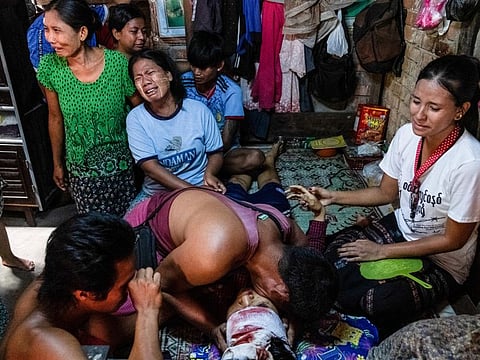Beaten, cuffed, hauled away: When Myanmar’s military comes knocking
Security forces shot and killed 64 people - including a young boy - on Saturday

Yangon: When the police and soldiers arrived in the middle of the night, they fired their guns into the air, threw stones through the windows and threatened to drive a car through the front door if no one opened it. Shwe Win and his family were asleep. It was 2.30am.
The police and soldiers had come to arrest Shwe Win’s son, Win Htut Nyein. When they found him, they beat and handcuffed the 19-year-old before hauling him away. His offence, the family was told, was taking videos of the police at a protest in Mandalay the day before.
More than two weeks later, Shwe Win is still searching for his son. Authorities say they have no record of his arrest.
“I felt so hopeless, like I had lost everything at that moment,” Shwe Win said. “I still don’t know where my son is. I don’t want him to die in their hands, and I worry that they will torture him.”
Myanmar’s security forces shot and killed at least 64 people - including a young boy - on Saturday.
Since the February 1 coup in Myanmar, millions of pro-democracy protesters have joined demonstrations against the military and participated in general strikes and a civil disobedience movement that have brought the economy to a virtual halt. Security forces have responded with increasing ruthlessness, shooting people in the streets and arbitrarily beating and arresting people.
Politicians, journalists, students and ordinary citizens have all been caught in the military’s clutches. Soldiers and the police invade homes in the middle of the night, searching for opponents of military rule. Many have gone into hiding. Some are arrested and released. Others wind up missing, tortured or dead.
The military’s actions have sent a chilling message: No one is safe.
“The scale of arrests since the coup gives you a clear indication of where the military junta is taking the country: a place with no space for critics or any political opposition to exist,” said Mu Sochua, a former member of Cambodia’s Parliament and part of a group of Southeast Asian parliamentarians who promote human rights.
As of Friday, the security forces had killed more than 320 people and arrested or charged more than 2,900, according to a group tracking arrests and killings. The youngest victim, 6, was shot and killed Wednesday while sitting on her father’s lap.
According to the UN High Commissioner for Human Rights, hundreds who were unlawfully detained have disappeared. At least five have died in custody and two appeared to have been tortured, the agency said.
Among those in custody are the country’s de facto civilian leader, Aung San Suu Kyi, and hundreds of newly elected members of Parliament, governors and other officials associated with her party, the National League for Democracy.
Like many of those arrested, Suu Kyi has not been allowed to speak with her lawyer. A court appearance Wednesday was cancelled.
As they carry out their arrests, soldiers and the police steal money, mobile phones and car keys, victims and witnesses said in interviews. Some protesters have said they were released only after paying money to the police.
They are the lucky ones.
In Mandalay, Myo Hein Kyaw, 24, disappeared after his arrest at a protest. His family was informed Friday - four days later - that he had died and that his body had been cremated.
In other cases, bodies have been returned to families with visible injuries and little explanation.
Zaw Myat Lynn, an activist with the National League for Democracy who headed a vocational training center for the party, was arrested around midnight March 8. The next day, the police directed his wife, Phyu Phyu Win, to go to a military hospital to identify his body.
She saw many bruises on his face, she said in an interview.
The rest of the body was wrapped in a cloth, but photos showed a wound to his abdomen, which was listed as the cause of death.
The official autopsy report said he had suffered the abdomen injury during an escape attempt when he jumped from a height of 30 feet onto a fence. His wife believes he was stabbed to death.
“When I saw his dead body, I was sure that they killed my husband after torturing him,” she said.
In the search for fugitives and anti-coup leaders, one common tactic is for the police to arrest family members and colleagues and try to extract useful information from them. Many of those being hunted are elected officials who have gone into hiding, including members of Parliament who have formed a group claiming to be Myanmar’s lawful government.
The regime’s spokesperson, Brig. Gen. Zaw Min Tun, acknowledged at a news conference Tuesday that the security forces had killed 164 people but claimed they all died while attacking the police and soldiers with Molotov cocktails and homemade smoke bombs.
The military did not comment on the protesters who have died or gone missing after being detained.
Members of the public now commonly call the security forces “terrorists” for their brutal methods when carrying out arrests and shooting randomly into crowds and homes.
Sign up for the Daily Briefing
Get the latest news and updates straight to your inbox









